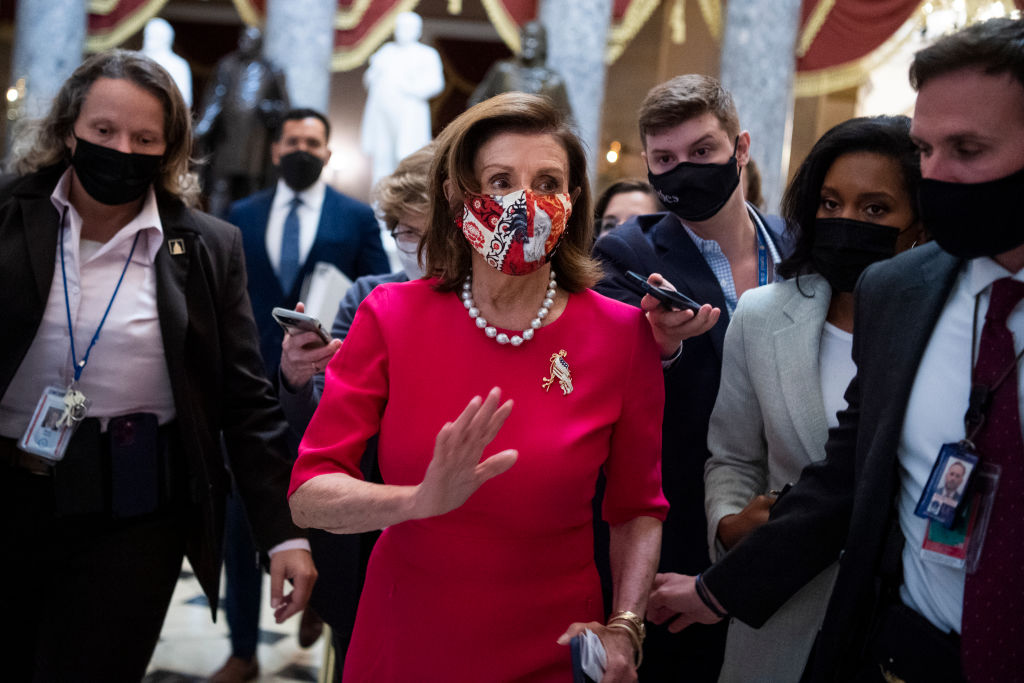
After House Speaker Nancy Pelosi suggested that she may push through the bipartisan infrastructure bill ahead of the Democrats’ larger social spending package, some House progressives say they are sticking with their original position: they won’t support the first bill unless they also get a vote on the second.
The infrastructure bill is a bipartisan plan to improve the country’s aging roads and bridges, while the Build Back Better spending bill is an ambitious social funding package that includes once-in-a-generation investments in childcare, home care, education and climate change mitigation. Facing a slim margin in the House and a 50-50 Senate, Democrats had planned to advance both bills at once to appease the moderate and progressive wings of the party, betting the fate of Joe Biden’s domestic agenda on the bills’ joint success. But now that plan is falling apart.
“We are a yes on the President’s agenda, a yes on both bills,” Rep. Ayanna Pressley, a prominent progressive in the House and a member of the Congressional Progressive Caucus (CPC), tells TIME. But, she says, “This caucus is united and strident, and I will vote no on a bipartisan infrastructure package without reconciliation, and I am not alone on that.”
That leaves the fate of both bills uncertain. Democrats—who control the House by a slim 220 to 212 margin—had counted on near-unified party support for Biden’s infrastructure bill. If enough progressives defect, there will likely not be enough Republican votes to pass it.
But lawmakers are still hashing out tense negotiations on the $3.5 trillion spending package, which Democrats plan to pass through a budget process called reconciliation that will allow them to pass it on a party-line vote. The final bill text is unlikely to be ready by Pelosi’s Thursday deadline for the infrastructure vote.
The major obstacle to Pelosi and Senate Majority Leader Chuck Schumer’s two-track plan is in the Senate, where Senators Kyrsten Sinema and Joe Manchin have balked at the $3.5 trillion price tag. On Monday, Pelosi told the Democratic caucus that their “approach had to change” because of the ongoing negotiations, leaving the door open to advancing the infrastructure bill without the spending package.
Progressives in the House are so far holding firm to their original position, sticking to a both-or-neither approach when it comes to the two major pieces of Biden’s domestic agenda. Rep. Mondaire Jones, who serves as one of the caucus’s deputy whips, says “a majority” of CPC members have said either privately or publicly that they won’t vote for the infrastructure bill without the spending bill. But moderate and conservative Democrats have been pushing for the opposite strategy: they want a vote on the infrastructure bill first, while they continue to haggle over the price of the reconciliation package. “Holding one hostage over the other is not fair,” Manchin said Tuesday, criticizing progressives for threatening to vote against infrastructure. “It’s not right. It’s not good for the country.”
“The issue isn’t floor procedure; the issue is that House Democrats cannot negotiate against themselves,” Rep. Katie Porter, deputy chair of the CPC, said in a statement to TIME. “Speaker Pelosi and President Biden are working tirelessly to advance the entirety of the Build Back Better agenda, which includes necessary investments in child care, elder care, stronger Medicare, education, and climate action. Progressives are eager to hear what the Senate will support, so we can move forward with all that our economy needs.”
Progressives say they are standing strong in their support for advancing both bills at once. “I have never felt more energized as a member of the CPC than today, when I saw dozens of my colleagues stand resolute in support of this president’s broadly popular economic agenda,” Jones says, adding that he’s optimistic that progressives and moderates in the House will prevail on reluctant moderate Democrats to “rise to the occasion and do what we rarely have the opportunity to do, which is deliver boldly for the American people and materially improve their lives.”
Outside of Congress, progressive activists are ratcheting up the pressure on moderate lawmakers to support both bills, warning that failure to meaningfully deliver on Biden’s campaign promises could imperil Democrats in the midterms. “Speaker Pelosi prioritizes protecting her majority, and she can’t do that if Dems fail to deliver on popular policies that they all want to run on,” said Ezra Levin co-executive director of Indivisible, one of many groups that helped deliver a Democratic majority in 2018, in a statement. “If Dems tried to run on just the McConnell-backed infrastructure bill next November, they’d be screwed, and she knows that.”
In the end, progressives say Americans won’t care about negotiations over the details of the spending bill and the procedure of how to pass it— they’ll only want to see results. “As I’m talking to people back in my district, they don’t understand or care to- they’re just trying to survive,” says Pressley. “They don’t have time to try to disentangle antiquated Washington procedures or D.C. process.”
For now, progressives say they’re sticking with their plan. “I see no evidence of the caucus backing down from the position that we’ve held throughout this time,” says Pressley. “We are holding the line to advance the President’s agenda, which is the people’s agenda.”
More Must-Reads from TIME
- Cybersecurity Experts Are Sounding the Alarm on DOGE
- Meet the 2025 Women of the Year
- The Harsh Truth About Disability Inclusion
- Why Do More Young Adults Have Cancer?
- Colman Domingo Leads With Radical Love
- How to Get Better at Doing Things Alone
- Michelle Zauner Stares Down the Darkness
Write to Charlotte Alter at charlotte.alter@time.com